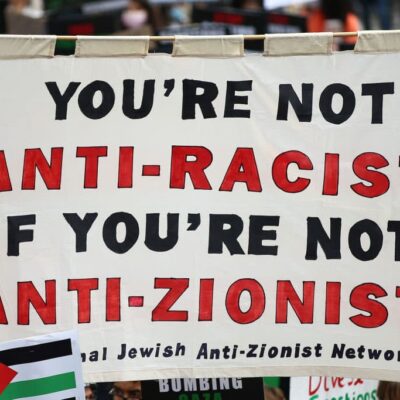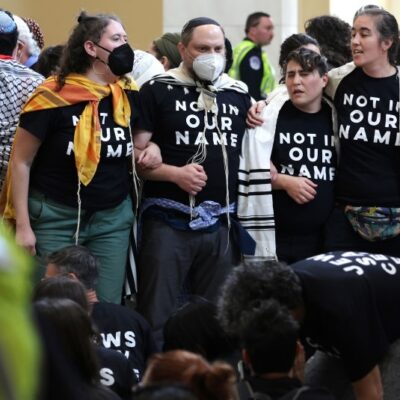Everything You Ever Needed to Know in order to Play in the 2020 Election and Still Keep your 501(c)(3) Status

By Steve Rabinowitz
American Jews have long played an important role in the American political process, voting and engaging in disproportionate numbers to the general population. We have an obligation to educate ourselves on the issues and to exercise our civic duty to vote. As pulpit rabbis, educators, organizational leaders and the more than mere frequent grasstops that so many of us are, we can play important roles in the electoral process, by teaching the values of our Jewish tradition, educating our congregants and members, and urging their involvement.
Synagogues and other nonprofit organizations are of course exempt from federal tax, and eligible to receive tax-deductible donations, under section 501(c)(3) of the Internal Revenue Code. Organizations exempt under this provision of the tax law are strictly prohibited from participating or intervening in “any political campaign on behalf of (or in opposition to) any candidate for public office.” The nature and scope of this prohibition as applied to religious organizations and their leaders is a complex subject that we will try to make understandable, in a practical way, through this FAQ.
The first thing to understand is that the prohibition on political activity described above is absolute. Even a “little bit” is not allowed. Engaging in prohibited political activity can jeopardize the tax-exempt status of a synagogue or Jewish institution or organization. It is important to note that the IRS, especially in the heated political season, is both vigilant and diligent in monitoring 501c3 restrictions, and therefor organizations must take these restrictions seriously and act thoughtfully.
The basic scope of the prohibition is that it applies to any communication on behalf of the organization, or the using of its name or resources for any communication that expresses or implies support for or opposition to a candidate or political party.
Synagogues/organizations may not endorse or oppose a candidate running for office, target their programs to assist or favor a political party or candidate, or coordinate activities with a party, candidate or organization supporting a candidate. They may not rate the candidates on issues nor express views about candidates’ positions in a way that makes clear that the synagogue/organization agrees/disagrees with the candidate about that issue.
These restrictions also apply to the actions of rabbis and other communal leaders while acting as representatives of their synagogues and/or organizations.
On the other hand, synagogues/organizations may engage in non-partisan election-related activities such as voter registration drives, Get-Out-The-Vote (GOTV) activities, and voter education programs that are not targeted to voters based on candidate or party preference and do not imply support for nor opposition to any candidate.
Further, the prohibitions do not apply to the political activities of these leaders undertaken in their individual capacities. Therefore, in their individual capacities and outside the context of any synagogue/organization-sponsored function or publication, even the most prominent leaders and others may endorse or oppose candidates and participate in campaigns, even give, or raise money. However, a rabbi or other leader must take steps to ensure that their actions are not attributed to their synagogue or organization. A rabbi’s political activities may be attributed to the synagogue/organization if they are undertaken during worship services or other shul/organization-sponsored functions, posted on official websites, or printed on organizational letterhead or on/in official publications. No leader may advocate from the bima nor use official funds, facilities, or other institutional assets to engage in partisan political activity.
While it is clear that the law absolutely allows individual leaders to endorse or oppose political candidates in their personal capacities, rabbis and other leaders must also attend to the interpersonal relationships that shape their institutions and how such endorsements might affect those relationships. This is not a matter of “tax” status nor law, but of the leadership stance of the individual leader and is not addressed in this guide. Prior to making such endorsements, prescient rabbis might engage in thoughtful conversation with the other leaders of their communities to ensure that those leaders are not surprised to learn of such coming personal endorsements and so that they understand the underlying principles guiding the rabbis’ choices. The dynamics of each individual rabbi or leader and community or organization are complex and worthy of extensive reflection and preparation.
I have consulted top nonprofit and political lawyers who specialize in such issues and reviewed numerous slightly similar guides and other helpful materials, much of which may be found at the end here, but this memorandum contains general guidelines and is not legal advice. Rabbis and other Jewish communal leaders should seek the legal guidance of their respective organizations’ official counsel and their own personal counsel for actual legal advice.
***
FAQs for Rabbis and Jewish Communal and Organizational Leaders
May I publicly endorse a candidate?
Yes, but only in your personal capacity. This means that (i) you may not make this endorsement from the bima or during any synagogue/organization event or through any kind of official communiqué, or using any synagogue/official resources to prepare or communicate about the endorsement, such as your synagogue or organization office, computer, phone or staff and (ii) wherever else and whenever you communicate the endorsement, you must make clear that your endorsement is solely on behalf of yourself and not your synagogue/organization. Often, the announcement of a list of religious leaders and/or others associated with 501c3 organizations such as yours will include disclaimer language such as, “Titles and organizations are listed for identification purposes only and do not indicate endorsement by the listed organization” and generally should include such.
May I be involved in a candidate’s campaign?
Yes, but again you must make clear that you are doing so as an individual and not as a representative of your synagogue/organization.
May I sign onto an ad endorsing a candidate?
Yes, provided that the synagogue/organization did not pay for any part of the ad, and that the ad notes something to the effect of, Titles and organizations are listed for identification purposes only and do not indicate endorsement by the listed organization.”
If I state that the endorsement is my personal view, may I publish my endorsement in my synagogue/organizational newsletter or on our synagogue/organization website?
No; the newsletter and website are official publications, and your endorsement there would constitute political campaign intervention.
May I encourage people to vote?
Yes, absolutely, so long as you don’t in any way indicate support for or opposition to any particular candidate or party. You can say, “This is a critically important election and I urge everyone to register and vote to make your voice heard.” You CANNOT say, “We need a change in the White House or in this country and I urge you to vote …” You may provide information about voter registration and polling places, as well, again without including any communication referencing or favoring any candidate or political party.
May I attend a fundraiser for a candidate?
Yes, again so long as any written materials listing those who attended the fundraiser makes clear you are attending in a personal, not official, capacity. If you speak at the fundraiser, make sure to note that you are speaking on behalf of yourself, not your synagogue or organization.
Will my synagogue/organization be at risk if a news report quotes me as endorsing a candidate but does not note that I was speaking on my own behalf?
No; so long as your remarks were not made at an official synagogue/organization event, and you were careful to say you were not representing your synagogue/organization. Ask for a correction, but it is not your fault they got it wrong, nor even if they never correct it.
When I am speaking from the bima, or to my organization, on various issues related to the election, may I note which candidate supports or opposes those issues?
No; that would constitute political campaign intervention. But that does not mean you are prohibited from commenting on actions or positions of incumbent public officials. Focus on the action or the statement and not the official. You can say, the federal government did X. That is wrong and inconsistent with Jewish values. You may teach from Jewish tradition and experience and speak about the issues and refer to government policies and actions, and the statements and actions of public officials made in that capacity. The challenge here, especially if you are going to articulate your own position, is not to take a stance which focuses on the official or candidate, their character or fitness for office, or other elements that could only be understood by listeners to be tantamount to supporting one candidate over another.
In talking about certain public policy issues, won’t it be obvious which candidate I support?
That may be true, but it is not the same as making a statement that implies support or opposition. As the election nears, this can be tricky, and Section 501c3 organizations must avoid any issue advocacy that functions as political campaign intervention. The IRS states: “Even if a statement does not expressly tell an audience to vote for or against a specific candidate, an organization delivering the statement is at risk of violating the political campaign intervention prohibition if there is any message favoring or opposing a candidate.” See discussion above.
FAQs Regarding Synagogue/Organization Activity
My synagogue/organization wants to hold a voter registration drive. Is that permissible?
Yes, it certainly may. You may set up a registration table, or send a letter to all your members encouraging them to vote and providing information on registering, along with a link to the National Mail Voter Registration form or other generic state specific forms. Same with early voting and states where you may request early vote materials and they are not provided automatically. You may not coordinate the drive with a candidate or campaign or any one political party. Voter registration and Early Vote must be non-partisan and you may not target people for a registration or Early Vote drive based on candidate, party, or issue preference. You CAN target citizens based on demographic factors including religion or ethnicity. You can focus a drive on unregistered citizens identified on a voter file as identifying as Jewish, for example
What about get-out-the-vote efforts?
Yes, you certainly may help get out the vote but again, not for any one candidate nor party. You may assist individuals with absentee ballots (in many states the same or nearly the same as Early Vote) and arrange transportation for people to get to polling places. Get-out-the-vote efforts must be targeted in a non-partisan fashion. You may target a list of voters identified as Jewish, or even lists of synagogue or organization but not party members, for a get out the vote message/communication that itself is nonpartisan and does not imply support for or opposition to a party or candidate.
May we sponsor a candidate forum?
Yes, and many 501(c)(3) organizations do so, including synagogues and Jewish community relations councils. But certain requirements must be met. First, all the candidates for a certain office, or all their surrogates, must be invited and given equal opportunities to participate. If it is impossible to invite all candidates running in a certain election because of the sheer number, the organization can establish pre-existing, objective criteria to select only several candidates – such as those reaching a certain threshold in public polls. The criteria cannot be structured with the intent to include or exclude certain candidates. The criteria must be formally adopted by the board or an authorized committee BEFORE candidates are invited.
Second, if it is a forum, all candidates must be given the exact same opportunity to participate. And if all candidates appear at the same forum, one at a time, each must be given equal time to speak and answer questions. If candidates appear at different events, the events must be held on days and times calculated to give each candidate roughly an equal audience – not one candidate on a Thursday morning and another Sunday evening.
Third, with respect to the topics candidates are asked to address and/or the questions put to the candidates, the synagogue/organization may not offer its view on any pertinent issues and the issues discussed should span a broad scope. The safest and best practice is to use a media personality or an academic as a moderator – NOT a synagogue member nor leader. Focusing on a small set of issues that are of specific relevance to the synagogue/organization is not allowed. Posing questions that make clear whether the organization will agree with the answer is also not permitted: “Do you agree that the next Congress should do XYZ with respect to Israel?.” For instance. And no fundraising nor electioneering is ever allowed.
May we invite candidates to attend official events?
Candidates, whether current office holders or challengers, may be invited to any event or worship service or to even attend without an invitation if open to the public. They may not campaign at the event or so much as mention their candidacy and no campaign activity may occur. If one candidate/public official is simply acknowledged, all must be.
May we invite individual candidates to speak at an event?
It depends. Technically, a public official or other well-known individual who happens to be a candidate for office can be invited to speak in their non-candidate capacity. But that will work only if it’s not close to the election, the individual really, genuinely has some other role and reason for speaking than their candidacy, and their candidacy is not mentioned in any advance publicity or at the event; no campaign activity occurs in connection with the candidate’s attendance; and a nonpartisan atmosphere is maintained on the premises or at the event when and where the candidate is present.
May we condemn something a candidate has said or done?
Yes, if the condemnation is expressed appropriately and is part of a pattern of calling out public and elected officials, whether candidates or not, for similar remarks or actions. You may condemn the action or statement based on Jewish teaching and values characterizing the action or statement—NOT the candidate. Do not talk about the public official/candidate’s character or fitness for office. You should exercise great caution when speaking from the pulpit or using an official organ of your organization, in issuing condemnations, even towards a statement or action. This is particularly true if the statement or action has become identified with a particular candidate.
EXAMPLE:
OK: State Senator Smith’s use of an antisemitic trope cannot be tolerated in our community. The words used connote antisemitic stereotypes of the kind that historically promote hatred and violence against Jews …
Not OK: State Senator Smith’s use of an antisemitic trope shows he is a closet antisemite, a bigot and not worthy of his office.
Note these restrictions apply to all candidates during campaign season but not to office holders who merely likely may run for (re)election.
May we make a voter guide available?
Yes, if it is a neutral questionnaire that was sent to all candidates and the responses of the candidates are reprinted in full, word for word, with no editing (although a word limit may be imposed on responses in sending out the questionnaire). You may not rate nor grade the candidates on the issues. The voter guide should span a broad scope of issues that would be pertinent for the type of office the candidate seeks. Focusing on a small set of issues is not allowed and may be viewed as the synagogue or organization urging readers to judge candidates in relation to their stances on specific issues.
May we advocate positions on issues, including local referenda, such as ballot initiatives and bond measures?
A 501c3 organization, while absolutely prohibited from engaging in partisan activity, is allowed to engage in lobbying on specific legislation, so long as such activity is not a “substantial part of the activities” in which it is engaged. For religious institutions, determination of what is “substantial” is based on all of the facts and circumstances. If any lobbying by the synagogue/organization is rare and involves only a miniscule portion of the institution’s resources, it is likely permissible. Advocating for or against a ballot measure counts as lobbying, not political activity, for purposes of this limitation. In addition, it may, without limit, educate voters and discuss the issues at stake in the election without advocating for or against a particular position on a measure. And you should not advocate for a position on a measure raised as an issue when it distinguishes between candidates for a given office. Your synagogue/organization should avoid comparing candidates to each other or implicitly advocating for one candidate or the other.
May we provide links to the websites of outside organizations that favor or oppose, whether implicitly or explicitly, a candidate?
No.
May we provide a mailing list or other support to particular candidates at little or no cost, or mail information supporting one candidate or party over another?
No.
May candidates place paid political advertisements in our publications?
Yes, political advertisements can be sold, but there are restrictions. Paid political advertisements need to be identified as such in the publication, and all candidates must have the same opportunity to purchase them. Moreover, the standard for accepting political advertisements must be identical to the standard the synagogue or organization uses for accepting typical advertisements. Costs must also be identical. Additionally, the synagogue/organization must explicitly say that the advertisement does not constitute an endorsement.
Outside groups often rent space in our facility for events. May we allow a candidate’s campaign or a political party to rent our facility for a campaign event?
Only if the synagogue/organization really makes the space available to all comers – which is unlikely – and then does so on exactly the same terms for political candidates and organizations. Otherwise, no.
May our synagogue or organization allow facilities such as an auditorium to be used as a polling location for the election?
Yes. Such use is by the government, not by any political committee or organization.
Here are some examples, originally provided by the IRS and modified to better fit our circumstances:
Example 1: Rabbi D is the rabbi and executive director of M, a section 501(c)(3) organization that educates the public on conservation issues. During a regular meeting of M shortly before the election, Rabbi D spoke on a number of issues, including the importance of voting in the upcoming election, and concluded by stating, “It is important that you all do your duty in the election and vote for Candidate W.” Because Rabbi D’s remarks indicating support for Candidate W were made during an official organization meeting, they constitute political campaign intervention by M and are therefore prohibited.
Example 2: Rabbi C is the rabbi of Congregation Beth L, a section 501c3 organization and Rabbi C is well known in the community. Three weeks before the election, she attends a press conference at Candidate V’s campaign headquarters and states that Candidate V should be reelected. Rabbi C does not say she is speaking on behalf of Beth L. Her endorsement is reported on the front page of the local newspaper and she is identified in the article as the rabbi of Congregation Beth L. Because Rabbi C did not make the endorsement at an official synagogue function, in an official shul publication or otherwise use the congregation’s assets, and did not state that she was speaking as a representative of Beth L, her actions do not constitute campaign intervention by Beth L.
Example 3: President E is the president of the Board of Society N, a historic synagogue that is a section 501c3 organization. In the month prior to the election, President E invites the three Congressional candidates for the district in which Society N is located to address the members, one each at a regular – and identical – worship service held on three successive weeks. Each candidate is given an equal opportunity to address and field questions on a wide variety of topics from the members. Society N’s publicity announcing the dates for each of the candidate’s speeches and President E’s introduction of each candidate include no comments on their qualifications or any indication of a preference for any candidate. Society N’s actions do not constitute political campaign intervention.
Example 4: Z, a section 501c3 organization, maintains a web site and posts an unbiased, nonpartisan voter guide in accordance with the guidance in the above FAQ’s. For each candidate covered in the voter guide, Z includes a link to that candidate’s official campaign website. The links to the candidate web sites are presented on a consistent neutral basis for each candidate, with text saying, “For more information on Candidate X, you may consult [URL].” Z has not intervened in a political campaign because the links are provided for the express purpose of educating voters and are presented in a neutral, unbiased manner that includes all candidates for a particular office.
Summary
It is important to note that while a single inadvertent transgression into political campaign intervention may not be fatal to tax-exempt status, the IRS expresses concerns if an organization engages in more than one type of activity and the interaction among those activities demonstrates a deliberate pattern of impermissible action. In addition, although certain election activities might not threaten an organization’s nonprofit status, it could suggest a partisan preference may be unwise from a community relations perspective. Some organizations have found it helpful to adopt policies that specify their rules regarding political activity, and particularly whether and under what conditions certain lay and professional leaders may engage in political activity.
Special Thanks
As noted, a number of other resources and experts were consulted in the writing and editing of this FAQ, first written four years ago for the Rabbinical Assembly and updated this year for the RA and United Synagogue. It is with their permission that a close version is being made available publicly. Special thanks to the most excellent political nonprofit lawyer Joe Sandler of Sandler Reiff Lamb Rosenstein & Birkenstock, P.C in Washington, to Steven Woolf and Stephan Kline, two great/smart tax and public policy lawyers and very senior folk in Jewish Federations’ Washington office, and to the RA’s Rabbis Jacob Blumenthal and Ashira Konigsburg, normally in New York.
Steve Rabinowitz is President and Co-Founder of Bluelight Strategies.
Helpful Links
21 Factual Situations from the IRS Involving Charities and Election Activities
Council of Nonprofits: Political Campaign Activities – Risks to Tax-Exempt Status
How Can Your 501 (c) (3) Organization Mobilize Voters in 2018?
Independent Sector Election Rules
IRS Guidance on Election Activities
JFNA Election Year Advocacy memo
NAACP Political Activities Guide for Religious Organizations
NAEYC The Do’s and Don’ts of Electoral Advocacy
Nonprofit Law Blog: Nonprofit Radio: Election Year Advocacy
Religious Action Center Get Out the Vote Guide 2020
The Rules of the Game: An Alliance for Justice Election Year Guide for Nonprofit Organization

 Add EJP on Google
Add EJP on Google










